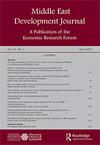Crony interlockers and the centrality of banks: the network of Moroccan listed companies
IF 0.9
Q4 DEVELOPMENT STUDIES
引用次数: 13
Abstract
ABSTRACT In this paper, we study crony capitalism through the lens of Moroccan listed companies and the role of the financial sector. We first highlight the role of banks in the history of Moroccan capitalism from the setting up of the French protectorate over Morocco to the dominance of some major family groups. Using a network analysis of board members of the Moroccan listed companies we confirm the centrality of finance compared to other sectors. We also measure the relational proximity to demonstrate that each cluster of the four main holding families has at least one financial company. Finally, we argue that crony interlockers, who are members of royal foundations and represent an institutional investor or a holding family that owns a bank and/or an insurance company, are the most central actors in the network of listed companies. Our contribution to crony capitalism in MENA analyses the politics of finance in a neoliberal and peripheral country such as Morocco. Boone and Henry [(2004). Neoliberalism in the Middle East and Africa: Divergent banking reform trajectories, 1980s to 2000. Commonwealth & Comparative Politics, 42(3), 356–392] had described the banking sector in Morocco as a private oligopoly. Here, we provide evidence that the monarchy and its entourage are capturing corporate governance instruments such as board membership to control economic activities.裙带关系和银行的中心地位:摩洛哥上市公司的网络
本文以摩洛哥上市公司和金融部门的角色为视角,研究裙带资本主义。我们首先强调银行在摩洛哥资本主义历史上的作用,从建立法国对摩洛哥的保护国到一些主要家族集团的统治。通过对摩洛哥上市公司董事会成员的网络分析,我们确认了与其他行业相比,金融的中心地位。我们还测量了关系接近性,以证明四个主要控股家族的每个集群至少有一家金融公司。最后,我们认为裙带联锁者是上市公司网络中最核心的角色,他们是皇家基金会的成员,代表机构投资者或拥有银行和/或保险公司的控股家族。我们对中东和北非地区裙带资本主义的贡献分析了新自由主义和外围国家(如摩洛哥)的金融政治。布恩和亨利[2004]。中东和非洲的新自由主义:不同的银行改革轨迹,1980至2000年。《联邦与比较政治》(Commonwealth & Comparative Politics, 42(3), 356-392)将摩洛哥的银行业描述为私人寡头垄断。在这里,我们提供的证据表明,王室及其随行人员正在获取公司治理工具,如董事会成员资格,以控制经济活动。
本文章由计算机程序翻译,如有差异,请以英文原文为准。
求助全文
约1分钟内获得全文
求助全文

 求助内容:
求助内容: 应助结果提醒方式:
应助结果提醒方式:


